It’s so hard to know what to keep in the story and what to take out so it’s not too long to share, especially since these were originally shared on Facebook.
Click to read part 1 and part 2.
The following are excerpts from Juan and Betty’s combined autobiography from the chapter titled, “Jumping the Hurdles to Marriage.” It’s written by Betty.
“In February of 1954 Norma Schofield and I left for Spain. We stopped in Paris on the way and got acquainted with President Harold W. Lee, of the French Mission.
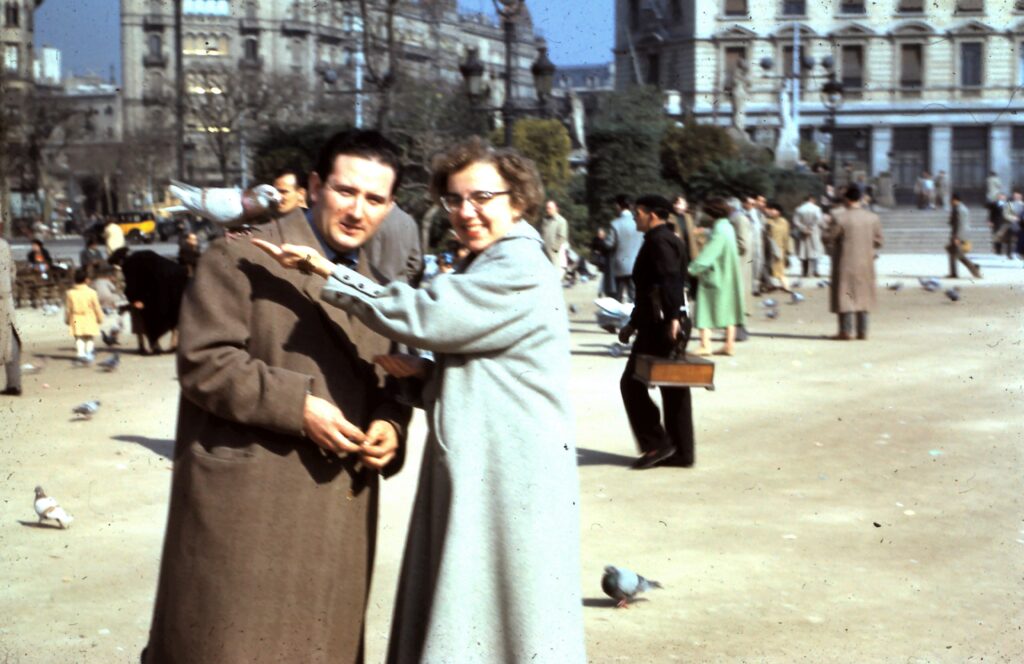
“In Spain Juan met us at the train, and yes, I did have strong feelings. Once again the Ventura family showed us Barcelona, but more than that, Juan and I talked and made plans for the future. He gave me a family ring as an engagement ring, and we planned for me to return in May. We didn’t know how I would pay for the trip or how our marriage could be arranged, but we said May. Under Spanish law, Juan was considered Catholic (although he had been baptized in the LDS Church) and I was considered “non-Catholic.” At that time in Spain Catholics could not marry non-Catholics; therefore we could not be married in Spain. The only solution was for us to go to France, but he had no passport. Bribes would have to be paid to get another.
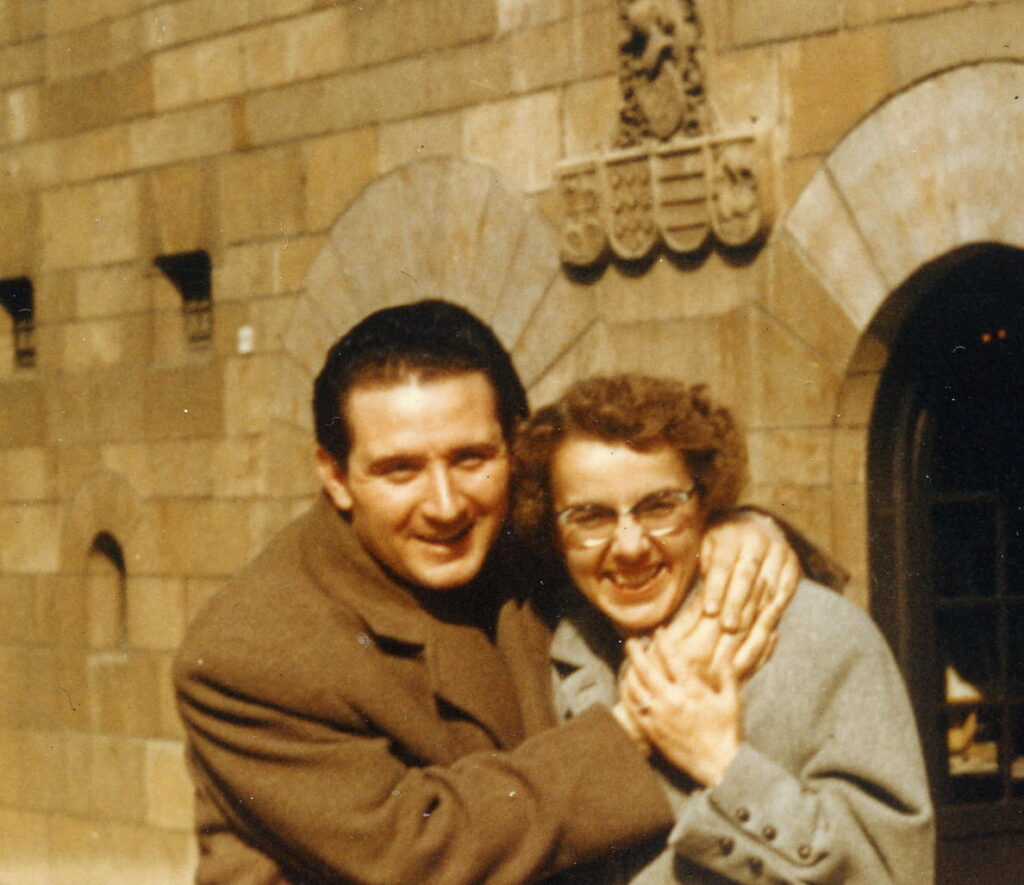
“This short stay in Spain we might consider our “courtship.” We now were now sure of our feelings for each other and were making plans for our marriage. It was a wonderful time, even though so much was unknown. There seemed to be so many obstacles in our path. But we were still optimistic that things were going to work out.
“On our return trip Norma and I stopped in Paris, and I explained our situation to President Lee. And that, if all went well, Juan and I would be seeing him in May. We came back to Salt Lake and Norma reported to my parents and gave her approval of Juan. This I found out years later. They and my sister Mary generously paid my expenses to be able to return to Barcelona once more. Regina Torres offered to make a “wedding dress” for me to wear.
“In May I set out once more for Spain, this time alone. I took with me two hundred dollars in small bills in a money belt around my waist. This was the amount Juan and I felt would be needed to get him a new passport, plus enough to travel to Paris and live sufficient time to marry and wait for his visa to come to the States. (How wrong we were on that figure!) I went by way of Washington, D.C. to see our Utah Senator, Arthur V. Watkins. I was told that after our marriage, to immediately send a notarized copy of our marriage certificate to him, and he would expedite Juan’s visa. That was very reassuring.
“I traveled by boat directly from New York to Barcelona, and Juan met me in the harbor. Now we could plan things together. Within a few days Juan was able to meet with his policeman friend and give him the money I had brought. He would go from office to office, paying $20 here and $20 there, and getting signatures and the necessary stamps, and eventually obtain the passport.
“We also went to see the priest over the parish of Gracia, who of course had never met Juan before. Juan told him our intentions and he made out a document stating that Juan was one of his parishioners, and that he would be marrying Betty Gibbs from the parish of Santa Magdalena (the only Catholic name I could think of) of Salt Lake City. When we got to Paris, this proved absolutely essential for us to get clearance. The Catholic Church certainly keeps tabs on its flock.
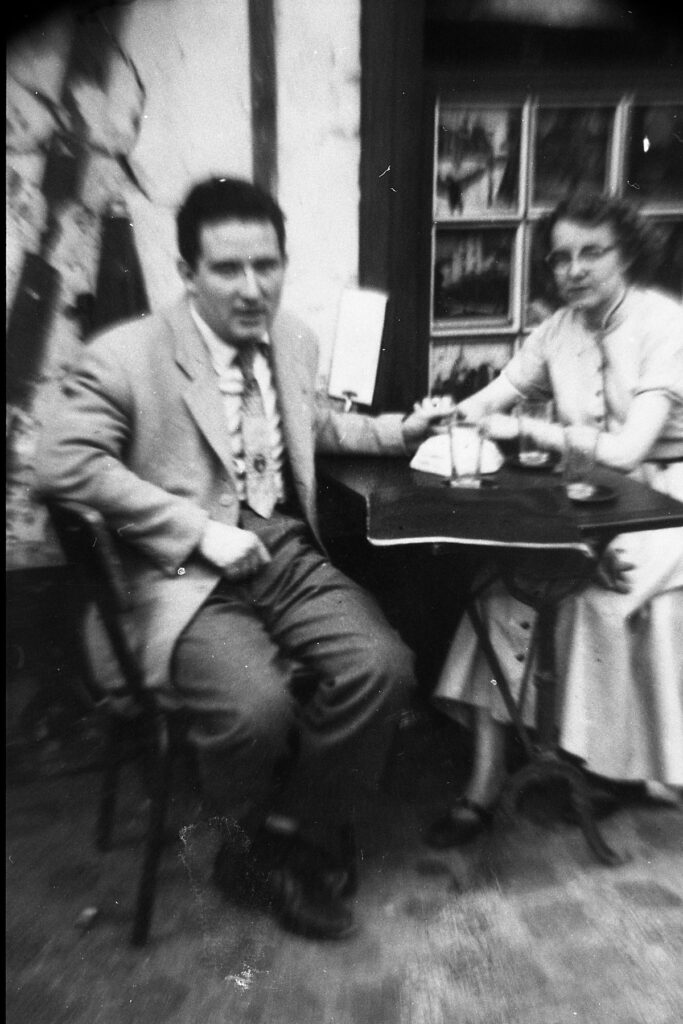
“So after a few days more, the policeman friend met us in a street café where he slipped Juan’s passport to him under a napkin. He said, “If you are stopped at the border, you don’t know how you were able to obtain it.” A few days later we boarded a train and were on our way. Yaya couldn’t stand saying goodbye inside the station, and we said our goodbyes to her at the entrance.
“Juan says his heart was in his throat when we reached the border. But they just glanced at his passport and there was no problem.
“In Paris we went to the mission home where Juan met President Lee. He was so kind to us. He arranged for Juan to stay at the mission home until we had done all the paper work to have the civil ceremony performed, and told us of a nearby small hotel, the Stella, where I could stay. He even offered to let us use a kitchen in the basement to fix our meals. That would save us a lot of money. Next we went to the American Embassy and talked to a lawyer who would help us get the necessary papers, of course for a price. The next six days were spent traveling all over Paris by subway, getting all kinds of tests to prove we were physically in a good state of health to marry. We had chest and blood tests, showing there was no disease of any kind, no tuberculosis, no venereal disease. The lawyer’s fee was $40.00, and with all the tests, and then translations from English or Spanish to French, our total expense came to $139.00. That was a small fortune in those days.
“Finally we had secured all the necessary papers and could be married. The actual ceremony took place May 19, 1954, at the 16th Arrondissement (district) of Paris. We asked two of the French missionaries to be our witnesses, Elders Bullock and Anderson. I wore Regina’s lovely dress and Juan looked very handsome in his suit. The four of us walked the few blocks from the mission home over to the government office.
“Here our documents were reviewed and approved. After a brief wait, the “mayor” of the district, wearing a red sash, pronounced the ceremony. Of course, it was all in French but Juan and the witnesses understood. Fortunately, as we came out of the building there was a photographer so we would have wedding pictures.
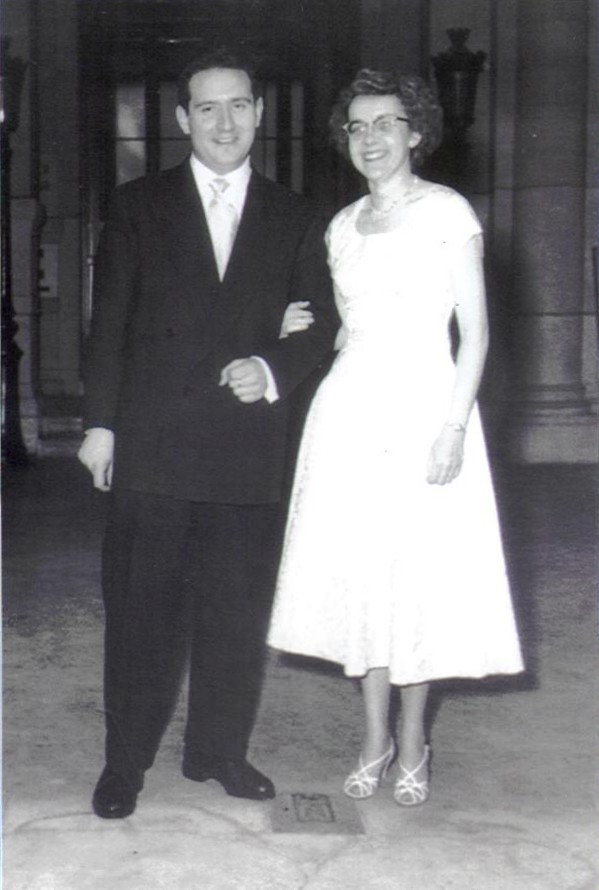
“Later in the day, back at the mission home at 3 rue de Lota, President Lee arranged for a short religious ceremony. They had me walk down the wide staircase that led from the upstairs into the foyer, while a sister missionary sang “Because.” Juan waited at the foot of the stairs. Then President Lee pronounced a blessing on our marriage – in English. Sister Lee had a nice “wedding dinner” arranged for us with their family and the office staff. Afterwards, since it was Mutual night, we attended Mutual — just for a while. Juan never got over that part.
“We then returned to the Hotel Stella, where Juan showed the manager our wedding certificate, which would allow him to “move in” with me, and our honeymoon began. The next day we mailed copies of the “legalized certificate” to Washington, to our Senator Watkins. Now all we had to do was to wait it out for a U.S. visa.
“We spent the next two months seeing Paris via subway. We saw the Arc de Triomphe, the Place de la Concorde, the Eiffel Tower, and the Bois de Boulogne. Juan didn’t want to go to the Louvre, but I had seen it with Norma my sister. We visited many interesting and free places in Paris, usually by subway. We became acquainted with some of the members of the Paris Branch, including a Brother Neu, a Jewish convert from Hungary. Fifty-two years later we met his son Robert in Salt Lake who caught up on what had happened to their family in the intervening years.
“We cooked our meals in the basement kitchen at the mission home. We felt like we were saving ourselves a lot of money, but even then we seemed to have to ask my parents over and over again to send more. France was expensive! On Sundays we attended services there in the mission home. I played the piano for the meetings. Juan received the Aaronic Priesthood and was ordained a deacon. We became good friends to several elders, Brebner, Kinsey, and our witnesses, Bullock and Anderson.
“One day as we were standing in the foyer, the huge chandelier in the chapel suddenly crashed to the ground. Luckily the room was empty. Juan told the president he could fix it. The two of them went out and bought another one, and Juan, by standing on a chair on top of a table, was able to rewire it. In appreciation, President Lee took us to Versailles in the mission car.
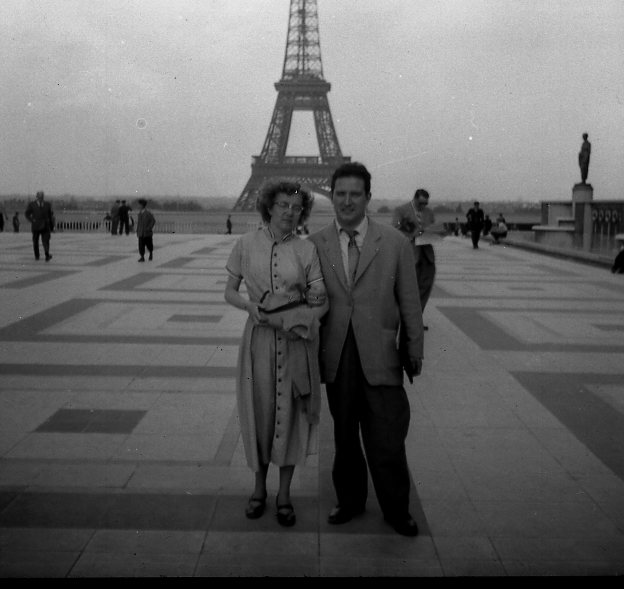
“We bought our food in the market. Everything would be cooked from scratch. Juan gave me a few cooking lessons, such as how to boil rice. My cooking skills up until then were limited to heating up canned foods and making cakes and cookies. We went on an outing in the Bois de Boulogne with the branch members and got to know them better.
“Juan’s visa to stay in France was only for three months, and time wore on. We became very nervous. Where could we go if the U.S. visa didn’t come in time? Not back to Spain! One Sunday we went into Sacrament Meeting with very sober looks on our faces. A sister, wife of one of the officials in NATO, saw us and asked us if “the two honeymooners had had a fight.” I explained our situation, that we were waiting for a visa for the States and time was running out. She said, “Oh, that’s no problem. My husband is in charge of the visas at the American Embassy!” That was truly a blessing from heaven.
“We gave her our address and the next day a courier from the Embassy came to our hotel and requested that we go to the Embassy. There Juan was given his visa and finally we could travel to the States. We bought boat tickets to sail that same week on the S.S. America. Then we told the Lees we would be leaving and thanked them for all their kindnesses.
“On the ship, it was tourist season and we were last-comers. Juan would be in one cabin on an upper deck, and I would be in another on a lower deck. Juan ended up with three other men of various nationalities. They found they all spoke French as a common language. I was with a lady and her little girl. Each morning we met at a certain spot and spent the day together.
“We finally arrived in New York where we stayed with our friend, Marie Marazzi. We were planning on coming straight to Salt Lake by bus, but Brother Balderas phoned us that Senator Watkins’ office wanted Juan to go to Washington, D.C. Here Juan met with a committee of the Senator’s and they questioned him on the status of “human rights” in Spain. The Spanish government was negotiating for a large loan from the U.S. Juan told them his story and that even the Boy Scouts were not allowed to function in Spain. (The loan still went through.)
“We then got on another bus and began our journey out to Utah. After three days and four nights, we arrived at the Salt Lake bus station at about 3 a.m. There were my dear parents, meeting their son-in-law for the first time, and dear friend, Norma Schofield, and members of the Mexican Branch. What a grand welcome they gave us!
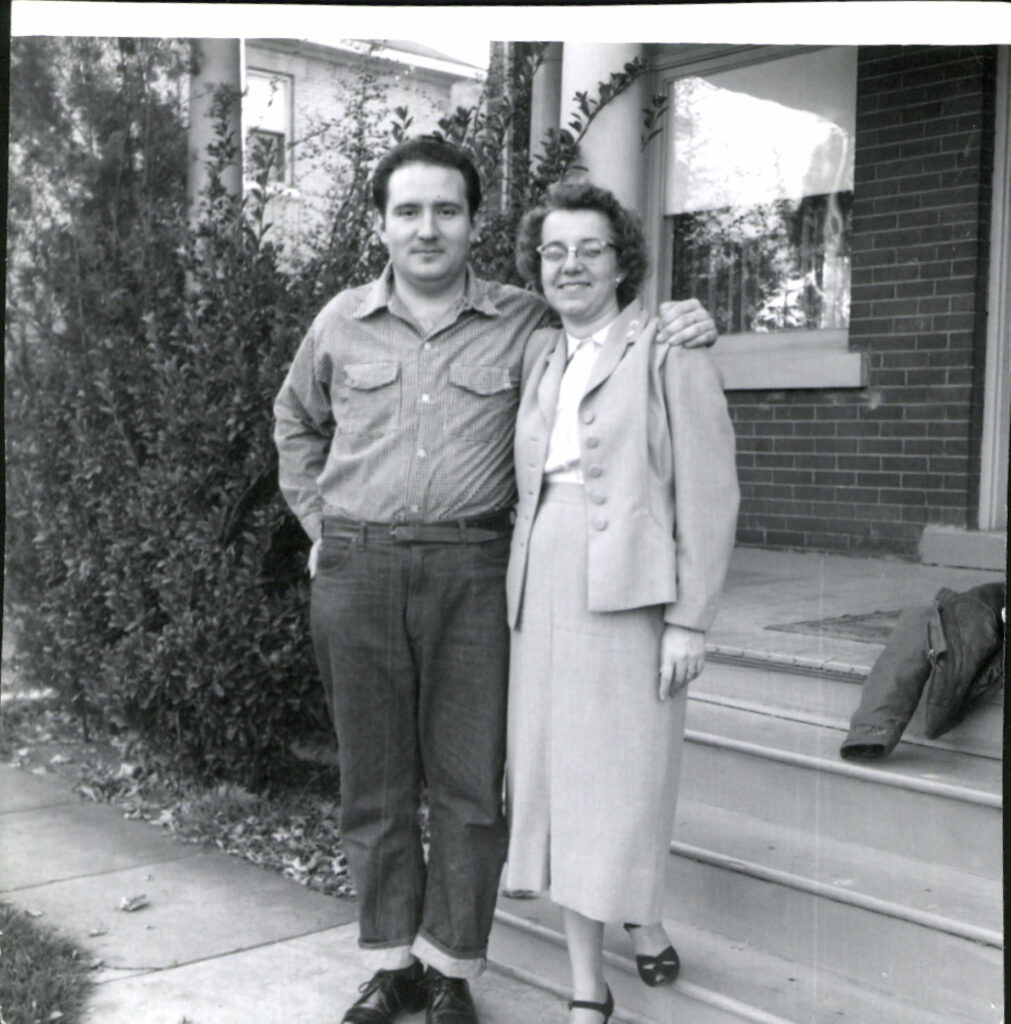
“We moved into the basement and a week or so later, Mother had a little reception for us. We never could have surmounted all the difficulties to accomplish our marriage and Juan’s coming to the States without many prayers being answered and the help and support of my parents.”
Juan had to adjust to life in America, learn to speak English, find work, etc. Read part 4 of their story here!
This story is so interesting! Thanks for sharing.